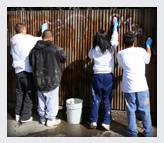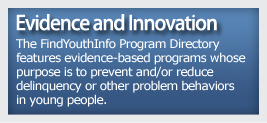Transition Age Youth
The Interagency Working Group on Youth Programs supports a number of efforts to build the skills and resources of youth aged 16-24. Whether they are called "youth in transition," "transition age youth," "youth aging out" or other terms, youth in this age group experience a number of challenges on their path to a successful adulthood. A particular challenge for federal programs is support for youth transitioning out of foster care or juvenile detention facilities, youth who have run away from home or dropped out of school, and youth with disabilities.
Youth Topics
Collaboration Profiles
Briefs
Youth Voices
Feature Articles
Tools & Guides
Programs
Technical Assistance
Websites
Publications
Videos & Podcasts
Data Sources
 |
How Individualized Education Program (IEP) Transition Planning Makes a Difference for Youth with Disabilities Youth who receive special education services under the Individuals with Disabilities Education Act (IDEA 2004) and especially young adults of transition age, should be involved in planning for life after high school as early as possible and no later than age 16. Transition services should stem from the individual youth’s needs and strengths, ensuring that planning takes into account his or her interests, preferences, and desires for the future. |
 |
Youth Transitioning to Adulthood: How Holding Early Leadership Positions Can Make a Difference Research links early leadership with increased self-efficacy and suggests that leadership can help youth to develop decision making and interpersonal skills that support successes in the workforce and adulthood. In addition, young leaders tend to be more involved in their communities, and have lower dropout rates than their peers. Youth leaders also show considerable benefits for their communities, providing valuable insight into the needs and interests of young people |
 |
How Trained Service Professionals and Self-Advocacy Makes a Difference for Youth with Mental Health, Substance Abuse, or Co-occurring Issues Statistics reflecting the number of youth suffering from mental health, substance abuse, and co-occurring disorders highlight the necessity for schools, families, support staff, and communities to work together to develop targeted, coordinated, and comprehensive transition plans for young people with a history of mental health needs and/or substance abuse. |
 |
Young Adults Formerly in Foster Care: Challenges and Solutions Nearly 30,000 youth aged out of foster care in Fiscal Year 2009, which represents nine percent of the young people involved in the foster care system that year. This transition can be challenging for youth, especially youth who have grown up in the child welfare system. |
 |
Coordinating Systems to Support Transition Age Youth with Mental Health Needs Research has demonstrated that as many as one in five children/youth have a diagnosable mental health disorder. Read about how coordination between public service agencies can improve treatment for these youth. |
 |
Civic Engagement Strategies for Transition Age Youth Civic engagement has the potential to empower young adults, increase their self-determination, and give them the skills and self-confidence they need to enter the workforce. Read about one youth’s experience in AmeriCorps National Civilian Community Corps (NCCC). |
 |
GEAR UP Program Succeeds In Helping Latinos Enter College In the fall of 1999, Art Castanon and Ana Coria were part of the seventh grade class at Sycamore High School in Anaheim that began GEAR UP—Gaining Early Awareness and Readiness for Undergraduate Program. |
 |
A Hand and Paw Partnership Benefits Homeless Youth Dogs, and people, learn new tricks at the Virginia Woof Dog Daycare Center in Portland, OR. Owned and operated by Outside In, a social service agency that serves homeless youth and low-income adults, the doggie daycare provides job training for 25 formerly homeless young people every year. |
 |
The Affordable Care Act Gives Young Adults Greater Control Over Their Own Health Care The Affordable Care Act provides financial relief, extends health coverage through parents and offers more affordable choices and competition for young adults. To learn more, check out our youth topic page on transition age youth. |
 |
U.S. Government sets goal to end youth homelessness in 10 years The U.S. Department of Education reported that 53,000 homeless youth were supported through school-based programs last year, and the U.S. Department of Housing and Urban Development counted more than 22,000 young people in emergency or transitional housing in 2009. |


Announcements
Youth Topics
Collaboration Profiles
Briefs

Map My Community is a tool designed specifically to assist you in locating resources in your community to help you build and strengthen your youth program. Get ideas for new partnerships, identify gaps in your community, and learn about resources to avoid duplication of effort.




















